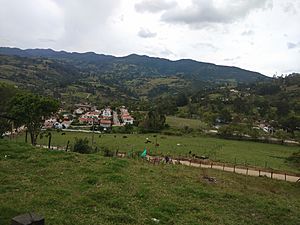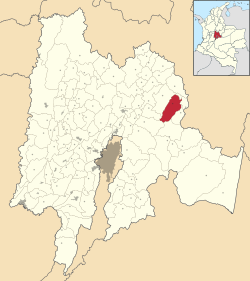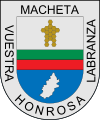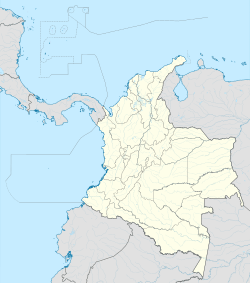Machetá facts for kids
Quick facts for kids
Machetá
|
|||
|---|---|---|---|
|
Municipality and town
|
|||

View of Machetá
|
|||
|
|||

Location of the municipality and town inside Cundinamarca Department of Colombia
|
|||
| Country | |||
| Department | |||
| Province | Almeidas Province | ||
| Founded | 1593 | ||
| Founded by | Miguel de Ibarra | ||
| Area | |||
| • Municipality and town | 229.35 km2 (88.55 sq mi) | ||
| • Urban | 5.35 km2 (2.07 sq mi) | ||
| Elevation | 2,094 m (6,870 ft) | ||
| Population
(2015)
|
|||
| • Municipality and town | 6,316 | ||
| • Density | 27.5387/km2 (71.325/sq mi) | ||
| • Urban | 1,498 | ||
| Time zone | UTC-5 (Colombia Standard Time) | ||
| Website | Official website: http://www.macheta-cundinamarca.gov.co/ | ||
Machetá is a cool town and municipality in Colombia. It's located in the Cundinamarca area, specifically in a part called Almeidas Province. Machetá is up high in the mountains, on a big plateau called the Altiplano Cundiboyacense.
This town is about 82.6 kilometers (51.3 miles) away from Bogotá, which is the capital city of Colombia. It's also 74.3 kilometers (46.2 miles) from Tunja. Machetá shares its borders with other towns like Tibiritá, Manta, Chocontá, Sesquilé, Guatavita, and Gachetá.
Contents
What Does Machetá Mean?
The name Machetá comes from the Chibcha language. This was the language spoken by the Muisca, who lived here long ago. In their language, Machetá means "Your honourable farmfields."
A Look at Machetá's History
Ancient Times: The Muisca People
Before the Spanish arrived, Machetá was home to the Muisca. They were an organized group of people who formed the Muisca Confederation. The area of Machetá was ruled by a leader called the zaque. This zaque was based in a place called Hunza, which is now known as Tunja, the capital of Boyacá Department.
Founding of Modern Machetá
The modern town of Machetá was officially founded in 1593. This happened thanks to Miguel de Ibarra. However, the town was first set up even earlier, in 1540. This was done by a soldier from the army of Gonzalo Jiménez de Quesada, who was a famous Spanish explorer.
What Machetá Does for a Living
The main way people in Machetá make a living is through agriculture. This means they grow a lot of crops. Some of the important products they farm include:
- Papa criolla (a type of potato)
- Arracacha (a root vegetable)
- Peas
- Tomatoes
See also
 In Spanish: Machetá para niños
In Spanish: Machetá para niños
 | Shirley Ann Jackson |
 | Garett Morgan |
 | J. Ernest Wilkins Jr. |
 | Elijah McCoy |




